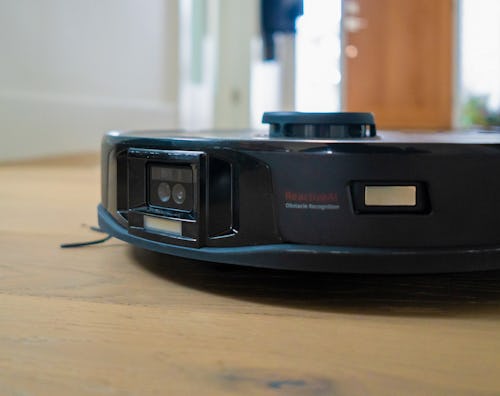
In the age of working from home, robot cleaners are a life hack that make the week a little bit easier by automatically taking care of cleaning your floors.
But, anyone who’s owned one will tell you they’re still a little bit of a hassle, given you need to empty the dustbin regularly, tidy up wires or other things on the floor, and untangle them whenever they get stuck.
Roborock’s new robot cleaner, the S7 MaxV Ultra, promises to solve almost every problem I’ve encountered with robot cleaners in the past. Not only does the S7 MaxV Ultra mop and vacuum your floors in a single robot. Not only that: It can automatically empty the dustbin, refill itself with water, and wash itself, draining away any dirty water after cleaning the mop. But, even more important: it uses a camera array and machine learning algorithms to identify objects on the floor and avoid them — including any accidents your pets may make.
With two pets at home we wanted a way to clean up after all of their shedding and mess, but worried about setting a schedule for our existing robot vacuum, the Roborock S7, in case one of our pets pooped on the floor and the robot drove it all around the house resulting in a ‘pooptastrophe’.
The S7 MaxV Ultra appealed because it promises to avoid creating poop nightmares, but also because we have both a dog and a cat that are incredibly fluffy and often come home muddy. Their lifestyles make keeping up with cleaning difficult unless we’re vacuuming and mopping often, let alone requiring near-constant emptying of any robot cleaner.
Input may receive a portion of sales if you purchase a product through a link in this article. We only include products that have been independently selected by Input’s editorial team.
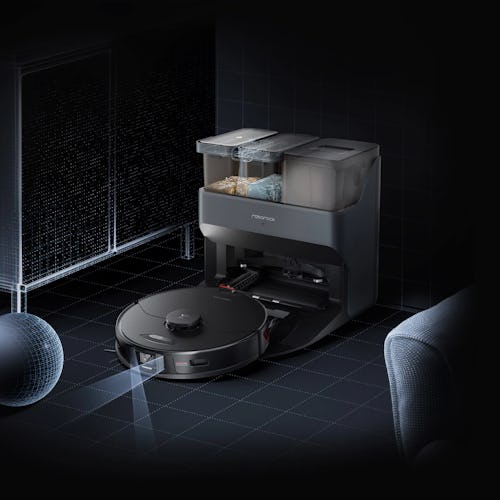
Self-cleaning
To pull off all of the promised magic automation, the S7 MaxV Ultra comes with an absolute monster of a dock that it uses to charge, but also washes the mop and stores any waste collected, fresh water, as well as dirty water. The idea is that you'll rarely need to refill the robot with water or empty a dustbin, because it’s all collected in a central place, unlike a Roomba that needs regular maintenance. If you’re in a small apartment, finding a space for that monster dock, which measures 19 inches wide and 16 inches tall, might be a challenge, but I was able to tuck it away in my laundry room.
Once you’ve got the dock set up and filled with water, the robot spends the first run around your home mapping out the space with its Lidar sensor and camera array, creating a 3D map that allows you to name rooms and send it to clean a single room or even exact spot if you wish. On the first run, it was immediately apparent how the S7 MaxV Ultra was different from other robot vacs that I’ve tried in the past: the camera array meant it avoided tangling itself and needing help and it was also much more adept at navigating our home without running into things.

As the robot navigated through my house and encountered things on the floor, it drove around them rather than bumping into them, and a tiny icon appeared in the app indicating it kept its distance from something that might tangle it intentionally. When it discovered a power strip under my couch, for example, I was able to tap the icon to actually see a photo of what it avoided and why.

At first this seemed like a gimmick, but the longer I used the S7 MaxV Ultra it became clear that it was much less likely to wind up stuck than my previous robot, thanks to the obstacle-avoidance cameras. Instead of getting stuck on a MacBook charger or tangled up on the laces of my shoes, it largely avoided problems that traditional robot vacuums need rescuing from. This isn’t to say that it never got stuck, but it’s a rarer occurrence than with any other robot cleaner I’ve tried, which is refreshing.
Poop-avoidance cameras
More importantly, those cameras really pull through when it comes to animal poop: our cat occasionally misses his litter box and during testing, the S7 MaxV ultra not only recognized his accident as ‘animal waste,’ it kept a wide berth to avoid it, carried on, and helpfully sent me a photo of the poop. If you’re a pet owner worried about your own ‘pooptastrophe,’ the S7 MaxV Ultra might make you a lot more comfortable investing in one.
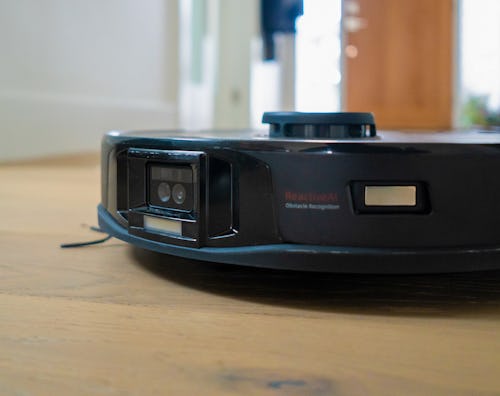
Because there are cameras onboard the S7 MaxV Ultra, Roborock actually built in a new feature that allows you to video call the robot and drive it around your own house if you want to. While it sounded ridiculous, it’s actually kind of awesome to be able to race a tiny robot around your house and check in on something if you need to, especially if you don’t have indoor cameras.
When we popped out to a bar without our dog one evening, we wondered what our dog was up to, so we dialed into the robot, drove it around, and (unsurprisingly) found her sitting at the door waiting for us to get home. You can talk through the robot if you like, though I didn’t do it to the dog as I knew it’d scare the heck out of her if my disembodied voice was suddenly coming out of the vacuum cleaner.
When I saw this feature advertised, I wondered about privacy. Couldn’t this type of thing be used to spy on someone unsuspectingly? Roborock seems to have anticipated this and has added a few layers of security that should stop any hackers (or potential abusers) from using unsuspecting people’s vacuums to spy on them. First, accessing the cameras is disabled by default and requires pushing and holding a physical button on S7 MaxV Ultra while it’s docked to enable it. Second, you need to set a pattern password to access the camera. But most importantly, the robot repeatedly announces loudly “remote viewing active,” meaning it would be very difficult to spy on someone without them knowing.
Deep cleaning
Compared with the S7 that I already have, the S7 MaxV Ultra is slightly better at sucking up dust and dirt from tricky spots like corners and under cabinets but otherwise does a great job of keeping the floor clean between deeper vacuuming sessions. The mopping is the real game-changer if you have predominantly hardwood floors like I do; when mopping is enabled, the front side of the vacuum sucks up dirt, and the back is a wet mop that vibrates to clean the floor as it drives around.
Not only is the mopping actually good on the S7 MaxV Ultra, it’s much better at keeping the house clean because it cleans the mop pads itself automatically. By default, every 30 minutes of cleaning, the robot trundles back to the dock and washes itself using a built-in brush that cleans the mop pad, then the robot carries on where it left off. Not only is the mop pad much cleaner, so it won’t spread dirt around as much, it’s a huge time saver — I rarely remembered to actually clean the mop pads on my S7, and they got nasty pretty quickly.
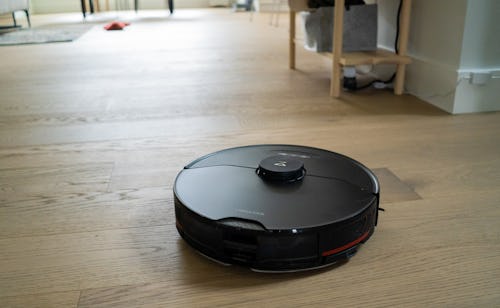
With all of the mopping and vacuuming features turned on, and the robot running on ‘balanced’ settings, the S7 MaxV Ultra had more than enough power to get through cleaning our entire 750-square foot (73 square meter) first floor without needing to charge itself partway through — but I think it would be able to clean spaces of twice the size on a single charge. If you have an even larger space that it can’t get through on a single charge or want to throw on the highest suction settings, the new dock charges the robot 30 percent faster than previous versions which means it’ll resume cleaning sooner.
Less hassle than a Roomba
All of this automation just makes it feel like you don’t need to baby the S7 MaxV Ultra as much as every other robot cleaner I’ve tried in the past: Every Roomba I’ve played with previously needed constant cleaning, untangling, refilling or emptying, and it sometimes felt like it wasn’t worth the hassle. The S7 MaxV Ultra, however, needs little intervention. It cleans itself, refills itself with water, and empties dirty water. All you need to do is empty the dock or refill the water when the app notifies you, which I found was about once a week on average but is likely to vary based on the size of your house and how often you actually run it.
I’ve got the S7 MaxV Ultra set up on a daily schedule to run a clean after we wrap up working for the day and it’s such a lifesaver when both working from home and having two fluffy pets — the house is much cleaner during the week after long days of calls, and it keeps on top of all of the fur without clogging up or spreading any pet accidents all over the floor.
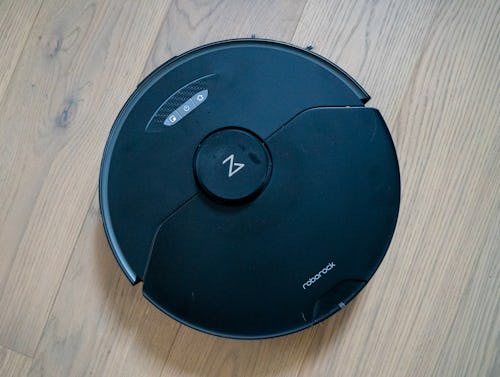
More importantly, I don’t feel like I have to rescue the vacuum cleaner every other day from being tangled up somewhere anymore, or too full of dirt to run. The S7 MaxV Ultra is an expensive investment, but as someone that’s committed to working from home for the long run, it’s a great quality of life improvement to have zipping around at our feet.
The Roborock S7 MaxV, which includes a basic charging dock and the computer vision-powered robot, will be available in the U.S. on April 8 for $859. The dust-emptying Plus dock will be available on the same day for $1,159, however, the Ultra dock that I tested, which empties and cleans the robot, won’t be available until later this year for $1,399. For people like me who are stuck at home all day, with pets, it saves a ton of time cleaning and feels worth the investment, especially over the span of many years. Life is too short to spend it doing mundane chores or maintenance.







